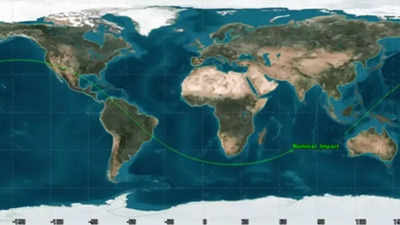Top Searches
- News
- India News
- India's Risat-2 re-enters Earth after 13.5 years, lands in Indian Ocean near Jakarta
India's Risat-2 re-enters Earth after 13.5 years, lands in Indian Ocean near Jakarta

BENGALURU: Indian radar-imaging satellite — Risat-2 — has made an uncontrolled re-entry into Earth’s atmosphere and landed at the predicted impact point in the Indian Ocean near Jakarta.
The re-entry happened on October 30, at around 12.06am, the Indian Space Research Organisation (Isro) has confirmed.
“Launched onboard PSLV-C12 in April 2009, Risat-2 weighed about 300kg and had carried 30kg fuel for an initial designed life of four years. With the proper maintenance of orbit and mission planning by the spacecraft operations team in Isro, by economical usage of fuel Risat-2 provided very useful payload data for 13 years,” Isro said.
On re-entry, there was no fuel left in the satellite and hence there are no contaminations or explosion by fuel is expected, Isro said, adding that studies confirmed that the pieces generated due to aero-thermal fragmentation would not have survived re-entry heating and hence no fragments would have impacted on Earth.
The Indian System for Safe and Sustainable Space Operations Management (IS4OM), which was operationalised recently at the Isro Telemetry, Tracking and Command Network (Istrac) centre in Bengaluru had been monitoring the re-entry for one month with analysis carried out by the Vikram Sarabhai Satellite Centre (VSSC) and Istrac teams through its in-house developed analysis software.
The teams were tracking the satellite utilising the multi-object tracking radar (MOTR) at the Satish Dhawan Space Centre (SDSC) in Sriharikota.
“MOTR tracked it regularly and the data was used for further analysis and orbit determination. The orbital data available from USSPACECOM were regularly used to predict the re-entry time and impact,” Isro said.
The Indian space agency too carried out.in-house predictions. “Risat-2 is a clear example of Isro’s capability to carry out spacecraft orbital operations in an efficient and optimal way. As Risat-2 re-entered within 13.5 years, it complied with all necessary international mitigation guidelines for space debris, showing Isro’s commitment towards long term sustainability of outer space as well,” Isro added.
The re-entry happened on October 30, at around 12.06am, the Indian Space Research Organisation (Isro) has confirmed.
“Launched onboard PSLV-C12 in April 2009, Risat-2 weighed about 300kg and had carried 30kg fuel for an initial designed life of four years. With the proper maintenance of orbit and mission planning by the spacecraft operations team in Isro, by economical usage of fuel Risat-2 provided very useful payload data for 13 years,” Isro said.
On re-entry, there was no fuel left in the satellite and hence there are no contaminations or explosion by fuel is expected, Isro said, adding that studies confirmed that the pieces generated due to aero-thermal fragmentation would not have survived re-entry heating and hence no fragments would have impacted on Earth.
The Indian System for Safe and Sustainable Space Operations Management (IS4OM), which was operationalised recently at the Isro Telemetry, Tracking and Command Network (Istrac) centre in Bengaluru had been monitoring the re-entry for one month with analysis carried out by the Vikram Sarabhai Satellite Centre (VSSC) and Istrac teams through its in-house developed analysis software.
The teams were tracking the satellite utilising the multi-object tracking radar (MOTR) at the Satish Dhawan Space Centre (SDSC) in Sriharikota.
“MOTR tracked it regularly and the data was used for further analysis and orbit determination. The orbital data available from USSPACECOM were regularly used to predict the re-entry time and impact,” Isro said.
The Indian space agency too carried out.in-house predictions. “Risat-2 is a clear example of Isro’s capability to carry out spacecraft orbital operations in an efficient and optimal way. As Risat-2 re-entered within 13.5 years, it complied with all necessary international mitigation guidelines for space debris, showing Isro’s commitment towards long term sustainability of outer space as well,” Isro added.
FOLLOW US ON SOCIAL MEDIA
FacebookTwitterInstagramKOO APPYOUTUBE
Start a Conversation
end of article









